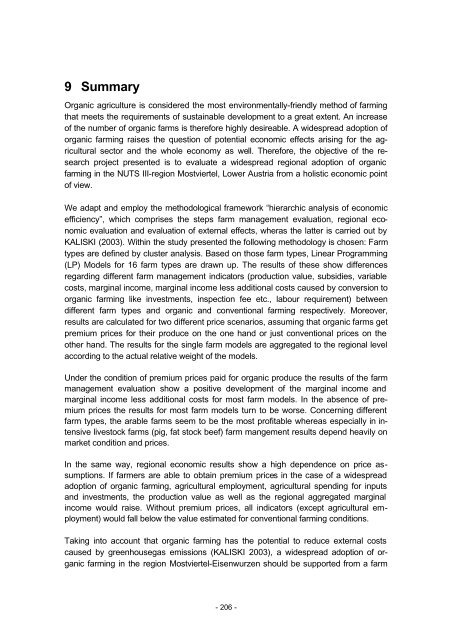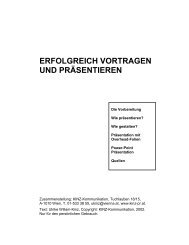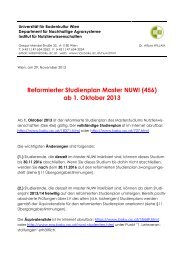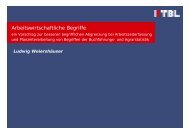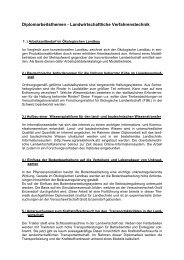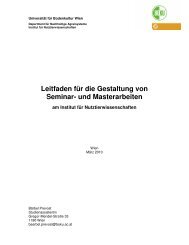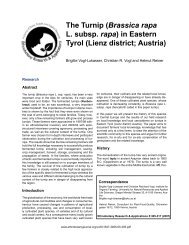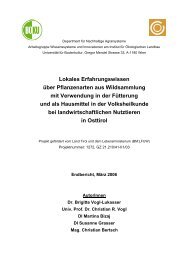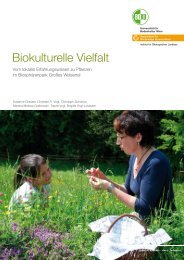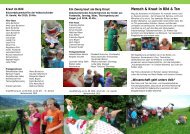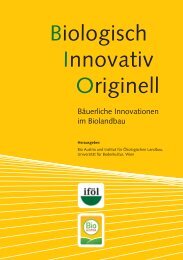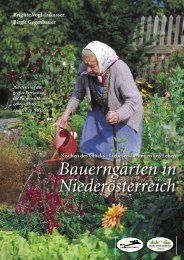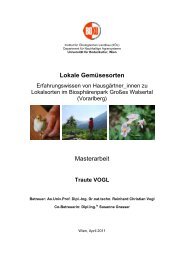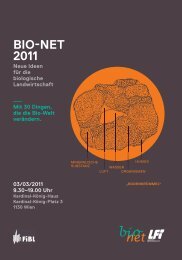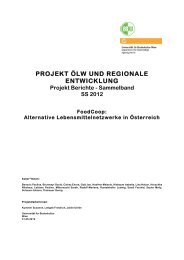Betriebs- und regionalwirtschaftliche Aspekte einer großflächigen ...
Betriebs- und regionalwirtschaftliche Aspekte einer großflächigen ...
Betriebs- und regionalwirtschaftliche Aspekte einer großflächigen ...
Erfolgreiche ePaper selbst erstellen
Machen Sie aus Ihren PDF Publikationen ein blätterbares Flipbook mit unserer einzigartigen Google optimierten e-Paper Software.
9 Summary<br />
Organic agriculture is considered the most environmentally-friendly method of farming<br />
that meets the requirements of sustainable development to a great extent. An increase<br />
of the number of organic farms is therefore highly desireable. A widespread adoption of<br />
organic farming raises the question of potential economic effects arising for the agricultural<br />
sector and the whole economy as well. Therefore, the objective of the research<br />
project presented is to evaluate a widespread regional adoption of organic<br />
farming in the NUTS III-region Mostviertel, Lower Austria from a holistic economic point<br />
of view.<br />
We adapt and employ the methodological framework “hierarchic analysis of economic<br />
efficiency”, which comprises the steps farm management evaluation, regional economic<br />
evaluation and evaluation of external effects, wheras the latter is carried out by<br />
KALISKI (2003). Within the study presented the following methodology is chosen: Farm<br />
types are defined by cluster analysis. Based on those farm types, Linear Programming<br />
(LP) Models for 16 farm types are drawn up. The results of these show differences<br />
regarding different farm management indicators (production value, subsidies, variable<br />
costs, marginal income, marginal income less additional costs caused by conversion to<br />
organic farming like investments, inspection fee etc., labour requirement) between<br />
different farm types and organic and conventional farming respectively. Moreover,<br />
results are calculated for two different price scenarios, assuming that organic farms get<br />
premium prices for their produce on the one hand or just conventional prices on the<br />
other hand. The results for the single farm models are aggregated to the regional level<br />
according to the actual relative weight of the models.<br />
Under the condition of premium prices paid for organic produce the results of the farm<br />
management evaluation show a positive development of the marginal income and<br />
marginal income less additional costs for most farm models. In the absence of premium<br />
prices the results for most farm models turn to be worse. Concerning different<br />
farm types, the arable farms seem to be the most profitable whereas especially in intensive<br />
livestock farms (pig, fat stock beef) farm mangement results depend heavily on<br />
market condition and prices.<br />
In the same way, regional economic results show a high dependence on price assumptions.<br />
If farmers are able to obtain premium prices in the case of a widespread<br />
adoption of organic farming, agricultural employment, agricultural spending for inputs<br />
and investments, the production value as well as the regional aggregated marginal<br />
income would raise. Without premium prices, all indicators (except agricultural employment)<br />
would fall below the value estimated for conventional farming conditions.<br />
Taking into account that organic farming has the potential to reduce external costs<br />
caused by greenhousegas emissions (KALISKI 2003), a widespread adoption of organic<br />
farming in the region Mostviertel-Eisenwurzen should be supported from a farm<br />
- 206 -


